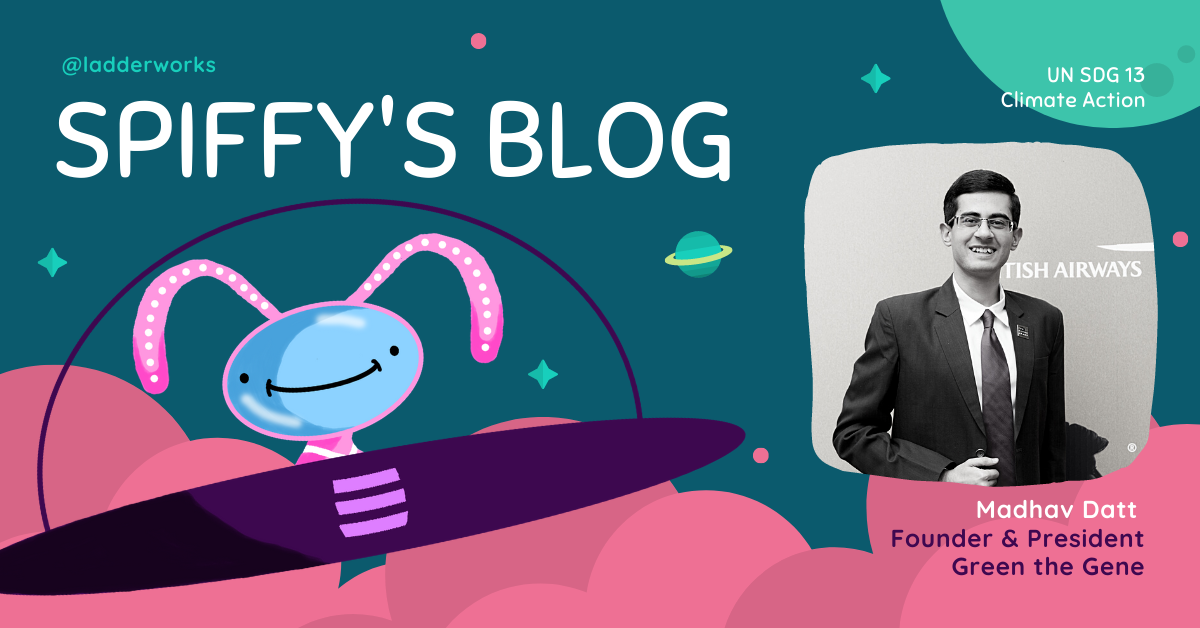Madhav Datt: Building Emergency Shelters for a Better Future
 Welcome back, everyone! I’m Spiffy, the interplanetary journalist reporting from Planet Earth with an eye on entrepreneurs making a difference on climate change. Today I’m thrilled to be talking to Madhav Datt from Green the Gene.
Welcome back, everyone! I’m Spiffy, the interplanetary journalist reporting from Planet Earth with an eye on entrepreneurs making a difference on climate change. Today I’m thrilled to be talking to Madhav Datt from Green the Gene.
Spiffy: Hi, Madhav! I understand you might know something that I don’t. :)
Madhav: Well, did you know that 42.3 million people lose their homes and are forcibly displaced due to natural disasters and the effects of climate change? These people are faced with realities that deny them a dignified life and fulfillment of their capabilities.
Spiffy: 42.3 million? That’s huge! :0
Madhav: Exactly! Today I’d love to talk about how we hope to change that by helping affected local communities, from across the world, break out of these cycles of survival-mode living.
Spiffy: I’m all ears! Now, I understand you were quite young when this all started. Is that true?
Madhav: Yes it is! When I was in third grade, we had a mandatory environmental science class. The only thing I remember was when our teacher told all of us eight-year-olds that in the state of Haryana, India – where I grew up – the water table was falling by almost two feet every year. The abstract idea of climate change suddenly became a very real problem that affected communities and people I knew. This realization inspired me to start Green the Gene as a small environmental club in school.
Spiffy: That’s amazing! I think your story will inspire a lot of children and youth to take action wherever they are. Your work has obviously evolved a lot since then. What innovation are you working on right now?
Madhav: We’re building Nostos - the first-of-its-kind, completely collapsible, modular, lightweight “shelter kit”. We’ve combined tech, data and design innovation to pioneer this idea so we can deliver the whole package — including living spaces, sanitation and energy access, all assembled (like LEGOSⓇ), into a home, by four people in less than one hour. We hope that Nostos homes act as a mechanism to help restore personal security, dignity and self-sufficiency in times of crisis and displacement.
Spiffy: Wow. What a phenomenal idea.
Madhav: Yes, and we’re super excited to share that we’re building the world’s first Nostos community! It’s a small village in India where people lose their homes due to annual cycles of flooding of the Ghataprabha River. It was very important for us to make this as low-cost as possible — we can house someone for just 20¢ a night! We expect this will lead to a 20% increase in education for displaced children and a 60% reduction in people impacted by diseases and hazards.
Spiffy: What an impact! When is a time you’ve had to confront failure in your plans? What did you learn from it?
Madhav: Funny you should ask. After our success at the World Bank, we were fully geared up to start building these units. But as COVID hit and countries started to go into lockdown, our manufacturing partnerships — along with our plans for deployment — went right out the window. This was actually an amazing learning opportunity for me. I learned about all the challenges involved in global logistics, but also about how to be scrappy and solve problems, while working around these challenges.
Spiffy: What did you end up doing?
Madhav: Well, we persisted through this and ultimately figured out a way to come out stronger! We’re now fabricating Nostos units entirely locally, without having to ship anything internationally.
Spiffy: That’s amazing! Necessity truly is the mother of invention! Are there any other insights that have emerged out of your lockdown?
Madhav: I’ve been staying with my family in India since the start of the pandemic, and we have four pet dogs here at home. They have thoroughly enjoyed having everyone at home and spending time with all of us. They always remind me of the thrill of small, everyday experiences of life, and the importance of taking time out for oneself.
Spiffy: That’s so important. Before we sign off, could you share one more important thing you’ve learned over the years?
 Madhav Datt and Kaushal Shetty presenting Nostos at the World Bank Youth Summit, Washington D.C. (Photo courtesy of Madhav Datt)
Madhav Datt and Kaushal Shetty presenting Nostos at the World Bank Youth Summit, Washington D.C. (Photo courtesy of Madhav Datt)
Madhav: Actually, yes. Early on in our work, while interacting with people affected by floods in Mumbai, my co-founder Kaushal Shetty and I realized something very interesting. While losing your home is devastating in itself, its implications go far beyond the roof over your head. You typically also lose access to your job, you don’t have access to safe water or sanitation, and more. Being forcibly displaced during disasters has this ripple effect on a person’s health, education, employment, and psychological safety. It touches everything.
Spiffy: Thank you for sharing your experience. I can’t wait to see how your work continues to impact people’s lives.
Madhav Datt is the founder of Green the Gene, one of the world’s largest completely youth-led environmental non-profits, spread across 62 countries involving over 7,000 youth volunteers. His work has received extensive international recognition including from HRH Prince William, the Prime Minister of India, CTO of Tesla, Royal Commonwealth Society, and Akon. (Nominated by the World Bank)


